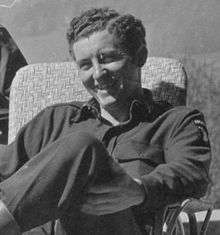Harry Welsh
| Harry Welsh | |
|---|---|
 | |
| Nickname(s) | "Welshy" |
| Born |
September 27, 1918 Wilkes-Barre, Pennsylvania, United States |
| Died |
January 21, 1995 (aged 76) Wilkes-Barre, Pennsylvania, United States |
| Allegiance |
|
| Service/branch |
|
| Years of service | 1942–1945 |
| Rank |
|
| Unit | E Company, 2nd Battalion, 506th Parachute Infantry Regiment, 101st Airborne Division |
| Battles/wars | World War II |
| Awards |
Bronze Star (2) (w.OLC) Purple Heart (2) Presidential Unit Citation (w.OLC) European-African-Middle Eastern Campaign Medal World War II Victory Medal Army of Occupation Medal Combat Infantryman Badge |
| Relations |
Catherine (wife) Kevin (son, predeceased) |
| Other work | Tax Collector, Director of Pupils, and teacher in the Wilkes-Barre high school district |
First Lieutenant Harry F. Welsh (September 27, 1918 – January 21, 1995)[1] was a commissioned officer of the United States Army who served with Easy Company of the 2nd Battalion, 506th Parachute Infantry Regiment, part of the 101st Airborne Division, during World War II. Welsh was portrayed in the HBO miniseries Band of Brothers by Rick Warden.
Youth
Welsh was born in Wilkes-Barre, Pennsylvania. A notable mining town in the northeast. He attended E. L. Meyers High School. Shortly after the Japanese attack on Pearl Harbor and the American entry in World War II, he enlisted in the United States Army, and volunteered for the paratroopers, part of the U.S. Army's newly-created airborne forces, sometime in 1942. He was assigned to Fort Benning with Colonel Reuben Tucker's 504th Parachute Infantry Regiment (PIR) as part of the 82nd "All American" Airborne Division, under Maior General Matthew Ridgway. While an enlisted man, Welsh was reportedly made a sergeant and then "busted" (demoted) to private six times for fighting. Three of his commanding officers saw his potential and recommended him for Officer Candidate School.
Military service
After graduating OCS, Welsh was transferred to the 101st Airborne, and was assigned to Easy Company, 506th Parachute Infantry Regiment, and quickly became friends with 1st Lieutenant Richard Winters.
Welsh jumped into Normandy on D-Day and did not find Easy until the next morning, shortly before the company was given the task of taking Carentan. When he joined the rest of his company, he was placed in charge of 1st platoon after Richard Winters took charge of the company.
On June 12, 1944, he led his platoon on a direct assault into Carentan.[2] He was pinned down until the rest of Easy Company moved into the town,[2] and after taking the town, the Company moved against a German counterattack south of Omaha Beach.[2] His platoon held the line with Easy Company;[2] during the Battle of Bloody Gulch, Welsh ran into an open field with an enlisted gunner, John McGrath, and knocked out a Sturmgeschütz III, a German armored vehicle, with a bazooka.[2] Elements of the 2nd Armored Division arrived in force and drove off the remaining Germans.[2]
After holding the line for another month, Welsh and the rest of Easy Company were relieved and shipped to England for refitting and replacements. He became Executive Officer of Easy Company.[3]
On September 1944, Welsh dropped into the Netherlands for Operation Market Garden and remained there for the duration of the operation. After its failure, Welsh and the rest of Easy Company returned to Mourmelon-le-Grand, France to await their next assignment.
On December 16, 1944, German armored divisions broke through the American lines in the Ardennes Forest. At this point, Welsh had been reassigned to Headquarters Company of 2nd Battalion;[4] his Division was then assigned to the defense of the town of Bastogne. During a battle on Christmas Day, Welsh was severely wounded.[5][6] Welsh was awarded two Bronze Stars for valor during his combat action, and two purple hearts for being wounded.[7]
Medals and decorations
| Combat Infantryman Badge | |
 |
Parachutist Badge with two combat stars |
| Bronze Star with one Oak Leaf Cluster | |
| Purple Heart with one Oak Leaf Cluster | |
| Presidential Unit Citation with one Oak Leaf Cluster | |
| American Defense Service Medal | |
| European-African-Middle Eastern Campaign Medal with three service stars and arrow device | |
| World War II Victory Medal | |
| Army of Occupation Medal | |
Later years
Welsh returned home and married Catherine "Kitty" Grogan.[8] For her wedding dress, she used silk from Welsh's reserve parachute.[8] They had one son, Kevin, who died before Welsh. Welsh spent time after the war at different jobs including a teacher at Wilkes-Barre area schools, a tax collector for Luzerne County, he finally became a director of pupils for the Wilkes-Barre area. He retired in 1983. Welsh died of heart failure on January 21, 1995, on his good friend Richard Winters' 77th birthday.[7] His wife Catherine died three years later in 1998.[9] He is buried in the Wilkes-Barre City Cemetery.[10]
References
Bibliography
- Winters, Major Dick, with Cole C. Kingseed (2006). Beyond Band of Brothers: The War Memoirs of Major Dick Winters. Berkley Hardcover. ISBN 978-0-425-20813-7.
- Ambrose, Stephen E. (1992). Band of Brothers: Easy Company, 506th Regiment, 101st Airborne from Normandy to Hitler's Eagle's Nest. Simon & Schuster. ISBN 978-0-7434-6411-6.